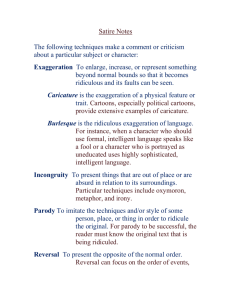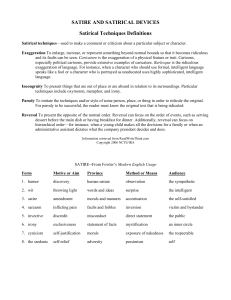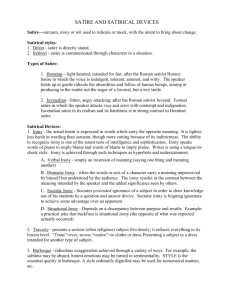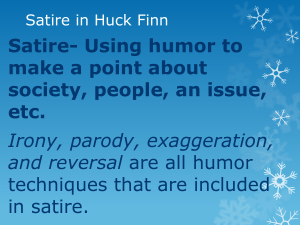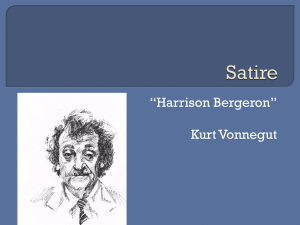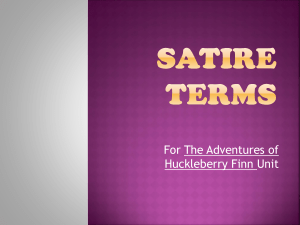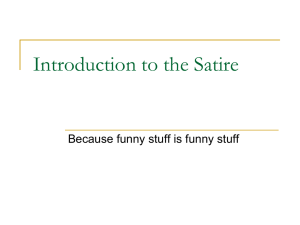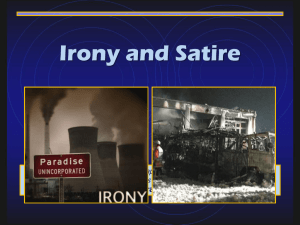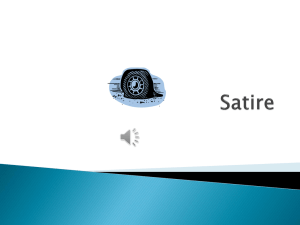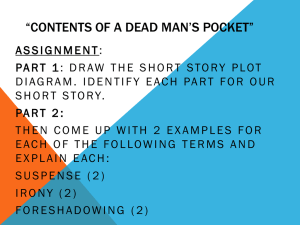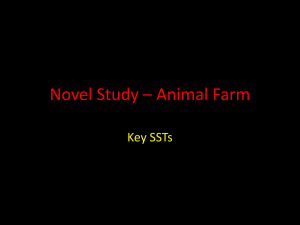SATIRE AND SATIRICAL DEVICES
advertisement
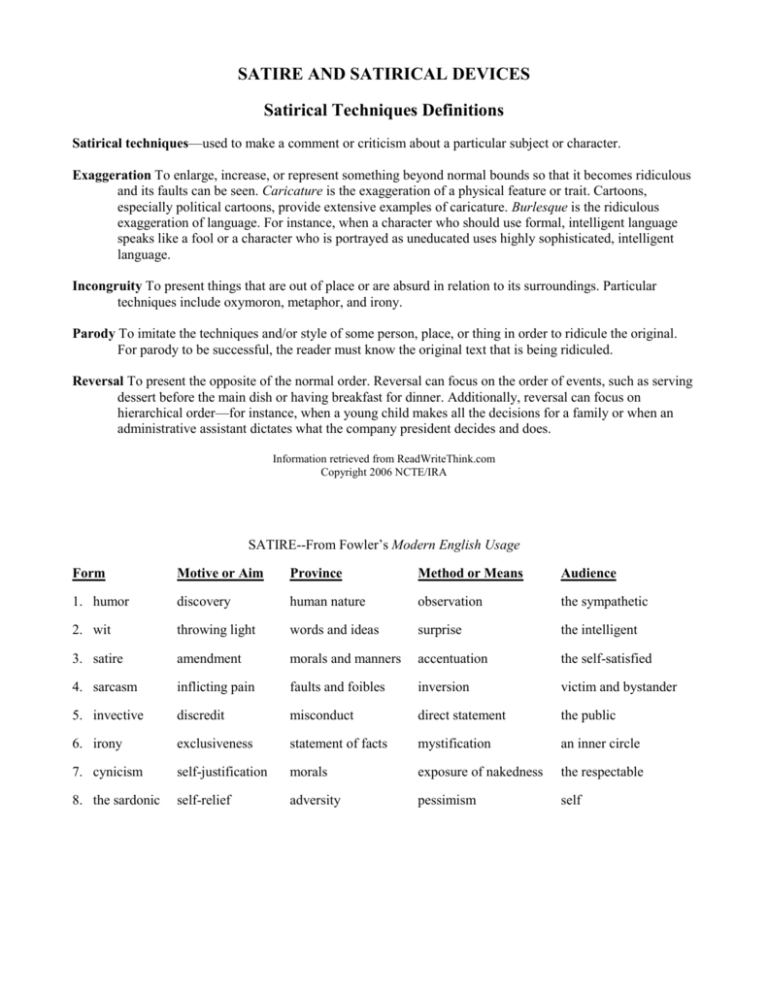
SATIRE AND SATIRICAL DEVICES Satirical Techniques Definitions Satirical techniques—used to make a comment or criticism about a particular subject or character. Exaggeration To enlarge, increase, or represent something beyond normal bounds so that it becomes ridiculous and its faults can be seen. Caricature is the exaggeration of a physical feature or trait. Cartoons, especially political cartoons, provide extensive examples of caricature. Burlesque is the ridiculous exaggeration of language. For instance, when a character who should use formal, intelligent language speaks like a fool or a character who is portrayed as uneducated uses highly sophisticated, intelligent language. Incongruity To present things that are out of place or are absurd in relation to its surroundings. Particular techniques include oxymoron, metaphor, and irony. Parody To imitate the techniques and/or style of some person, place, or thing in order to ridicule the original. For parody to be successful, the reader must know the original text that is being ridiculed. Reversal To present the opposite of the normal order. Reversal can focus on the order of events, such as serving dessert before the main dish or having breakfast for dinner. Additionally, reversal can focus on hierarchical order—for instance, when a young child makes all the decisions for a family or when an administrative assistant dictates what the company president decides and does. Information retrieved from ReadWriteThink.com Copyright 2006 NCTE/IRA SATIRE--From Fowler’s Modern English Usage Form Motive or Aim Province Method or Means Audience 1. humor discovery human nature observation the sympathetic 2. wit throwing light words and ideas surprise the intelligent 3. satire amendment morals and manners accentuation the self-satisfied 4. sarcasm inflicting pain faults and foibles inversion victim and bystander 5. invective discredit misconduct direct statement the public 6. irony exclusiveness statement of facts mystification an inner circle 7. cynicism self-justification morals exposure of nakedness the respectable 8. the sardonic self-relief adversity pessimism self Satire—sarcasm, irony or wit used to ridicule or mock Satirical styles: 1. Direct satire is directly stated 2. Indirect satire is communicated through characters in a situation Types of Satire: 1. Horatian—light-hearted, intended for fun 2. Juvenalian—bitter, angry attacking Satirical Devices: 1. Irony—the actual intent is expressed in words which carry the opposite meaning. It is lighter, less harsh in wording than sarcasm, though more cutting because of its indirectness. The ability to recognize irony is one of the surest tests of intelligence and sophistication. Irony speaks words of praise to imply blame and words of blame to imply praise. Writer is using a tongue-in-cheek style. Irony is achieved through such techniques as hyperbole and understatement. A. Verbal Irony—simply an inversion of meaning B. Dramatic Irony—when the words or acts of a character carry a meaning unperceived by himself but understood by the audience. The irony resides in the contrast between the meaning intended by the speaker and the added significance seen by others. C. Socratic Irony—Socrates pretended ignorance of a subject in order to draw knowledge out of his students by a question and answer device. Socratic irony is feigning ignorance to achieve some advantage over an opponent. D. Situational Irony—depends on a discrepancy between purpose and results (e.g., a practical joke that backfires). 2. Travesty—presents a serious (often religious) subject frivolously, reducing everything to its lowest level. “Trans”=over, across “vestire”=to clothe or dress; presenting a subject in a dress intended for another type of subject. 3. Burlesque—ridiculous exaggeration achieved through a variety of ways. For example, the sublime may be absurd, honest emotions may be turned to sentimentality. STYLE is the essential quality in burlesque. A style ordinarily dignified may be used for nonsensical matters , etc. 4. Parody—a composition imitating another, usually serious, piece of work designed to ridicule in nonsensical fashion an original piece of work. Parody is in literature what the caricature and cartoon are in art. **NOTE—TRAVESTY, BURLESQUE & PARODY are similar, but travesty always makes a mockery of a serious subject, whereas burlesque and parody may do the reverse. 5. Farce—exciting laughter through exaggerated, improbable situations; usually contains low comedy: quarreling, fighting, coarse with, horseplay, noisy singing, boisterous conduct, trickery, clownishness, drunkenness, slap-stick. 6. Invective—harsh, abusive language directed against a person or cause. Invective is a vehicle, a tool of anger. Invective is the bitterest of all satire. 7. Sarcasm—a sharply mocking or contemptuous remark. The term came from the Greek word “sarkazein” which means “to tear flesh.” 8. Knaves & Fools—in comedy there are no villains and no innocent victims. Instead, there are rogues (knaves) and suckers (fools). The knave exploits someone “asking for it”. When these two interact, comic satire results. When knaves & fools meet, they expose each other. 9. Malapropism—a deliberate mispronunciation of a name or term with the intent of poking fun. Information retrieved from URL: http://home.flash.net/~ghoyer/comedy/SATIRE%20AND%20SATIRICAL%20DEVICES.htm Examples: Thou shalt have one God only: who Would be at the expense of two? No graven images may be Worshipped, except the currency:\ Swear not at all; for thy curse Thine enemy is none the worse: At church on Sunday to attend Will serve to keep the world thy friend: Honour thy parents; that is, all From whom advancement may befall: Thou shalt not kill; but need’st not strive Officiously to keep alive: Advantage rarely comes of it: Thou shalt not steal: an empty feat, When it’s so lucrative to cheat: Bear not false witness; let the lie Have time on its own wings to fly: Thou shalt not covet, but tradition Approves all forms of competition. Arthur Hugh Clough---travesty example Forgive, O Lord, my little joke on Thee And I’ll forgive Thy great big one on me. Robert Frost UNFORTUNATE COINCIDENCE By the time you swear you’re his, Shivering and sighing And he vows his passion is Infinite, undying— Lady, make a note of this;. One of you is lying. Dorothy Parker A MAN SAID TO THE UNIVERSE A Man said to the universe: “Sir, I exist!” “However, “ replied the universe, “The fact has not created in me A sense of obligation.” Stephen Crane-- Information retrieved from URL: http://home.flash.net/~ghoyer/comedy/SATIRE%20TABLE.htm
